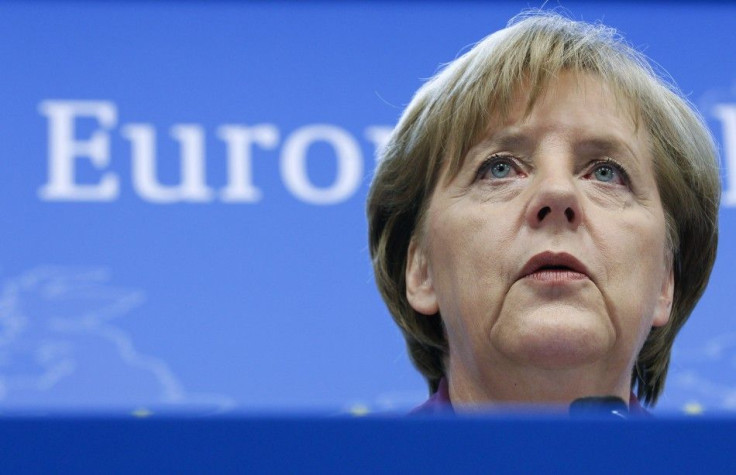Germany Faces Recession Risk as Crisis Hits Confidence

(REUTERS) After breezing through the euro zone debt crisis for the past two years, Germany's economy could fall into recession as anxious businesses hold off on investment and exports wither.
Economists who once predicted a mere slowdown in growth for Europe's largest economy are now slashing their forecasts and predicting contraction, possibly for two consecutive quarters, depriving the region of its most powerful motor.
In a sign the government is worried about the darkening economic outlook, Berlin last week resurrected its bank rescue fund and said it could reinstate Kurzarbeit subsidies that helped firms pare back working hours without firing staff.
Both measures were first introduced at the height of the global financial crisis, when the German economy suffered its worst annual contraction since World War Two.
It's not a classical recession, here we are dealing with a large amount of uncertainty due to the euro zone crisis which will weigh on investment and trade, said Felix Huefner, an economist at the Organisation for Economic Co-operation and Development (OECD) in Paris, who follows Germany.
The fundamentals actually look better than in other countries, with little need for fiscal consolidation, solid household debt levels, unemployment at a 20-year low.
Huefner said Germany had nonetheless entered a mild recession, with the economy likely to contract in the fourth quarter, and stagnate in the first three months of 2012.
Some are much more gloomy: the Duesseldorf-based IMK on Tuesday became the first major German economic institute to predict the economy would shrink over the full year, forecasting contraction of 0.1 percent.
Firms look set to hold back on investment because they are uncertain they will be able to sell their wares with key export markets reducing spending and implementing austerity measures.
This will deprive the economy of what was one of the main drivers of growth. Capital equipment spending contributed 0.2 percentage points to third quarter expansion.
The ZEW index of German analyst and investor sentiment has declined nine times over the past ten months.
The key factor is the euro crisis which has been getting worse over the last month, said Christian Schulz of Berenberg Bank, which sees the economy contracting 0.1 percent in Q4 and 0.9 in the first quarter of 2012.
There was hope the EU summit might resolve it, but those hopes were disappointed, he said, referring to a meeting of European leaders on December 9th at which they agreed to move towards a form of fiscal union but failed to map out a clear path for shielding big economies like Spain and Italy.
Recent data showed German exports falling in October at their sharpest rate in half a year. A breakdown of unadjusted month-on-month data showed exports to the crisis-hit euro zone dropping 8.5 percent, versus a 6.1 percent overall slide.
Economists say emerging markets, where growth is strong but easing, are unlikely to lend enough support to compensate.
The head of Germany's exporters' association (BDA), Anton Boerner, has likened the euro zone debt crisis to a sword of Damocles hanging over the real economy.
The export-dependent manufacturing sector contracted for a third straight month in December on a steep fall in new orders, Markit's purchasing managers' index showed last week.
Several German firms have already fallen victim to the tougher climate. Solar module maker Solon and the world's No.3 printing machine maker Manroland have both filed for insolvency.
Not everyone is so downbeat, however. After reporting a slight rise in its business climate index this week, the Ifo think tank played down the prospects of a recession.
Europe will end up getting a mild recession while Germany will be able to disconnect from that somewhat. We don't see any signs of a recession for Germany at the moment, Ifo economist Klaus Abberger told Reuters.
WEAK DOMESTIC DEMAND
Private consumption, which grew at its strongest pace in more than a year in the third quarter on a robust labor market, offers a glimmer of hope for the economy.
Unemployment fell more than expected in November and the jobless rate is at a 20-year low. Trade unions have been negotiating higher wages and consumer morale held steady into January on better income expectations and views of the economy.
However, private consumption is taking off from a very low level in Germany where savings levels are traditionally high and consumers wary, and it will not be able to offset the decline in investments and exports.
Economists also see downside risks for consumption because of the euro zone crisis. Metro, the world's No.4 retailer, issued a profit warning this month, saying the crisis was undermining sentiment and Christmas trade had started slowly.
Employment trends lag changes in growth and cautious German unions may be more focused on job security than seeking large wage hikes amid so much economic uncertainty.
Any small wage rises will be offset by inflation, which is stronger in Germany than the euro zone at large, market researchers GfK said, predicting consumers' purchasing power would stagnate next year in real terms.
Thus, this downturn will expose again the imbalances in Germany's economy - its dependency on external demand and the weakness of its domestic sector.
Germany won't be able to rely on exports to drive growth and business investment will only hold up if there is a recovery in domestic demand, said Simon Tilford, chief economist at the Centre for European Reform in London.
So everything hinges on getting domestic demand growing sustainably and there are some formidable obstacles to that.
Tilford said Germany should for example hike wages and ease back on fiscal consolidation - unlikely given Berlin is Europe's fiscal hawk.
Germans' outlook is better than much of Europe but the idea Germany is on the cusp of a decade of rapid growth is fanciful, he said. The outlook for German growth is pretty poor.
(Editing by Mike Peacock)
© Copyright Thomson Reuters 2024. All rights reserved.



















